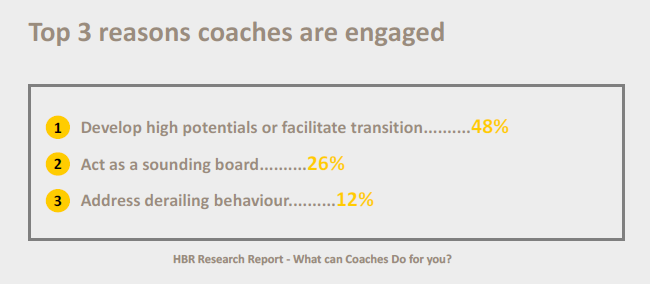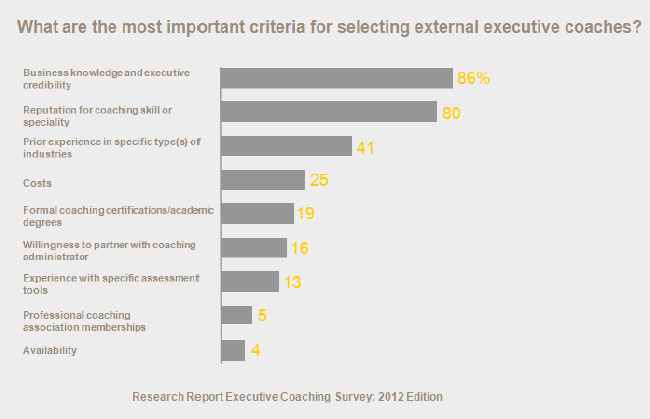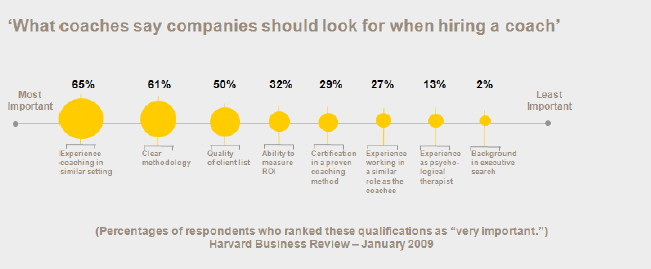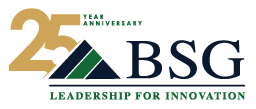Get yourself ready to be coached
If you have ever wanted to engage an executive coach you will know only too well the bewildering array of providers, philosophies and qualifications that accost you the moment you type ‘coaching’ into your search engine. Certainly coaching is a burgeoning industry and there will never be a shortage of individuals and organisations that claim they can perfectly meet your needs. But ‘Buyer Beware!’ It is also an unregulated industry and anyone can set themselves up as a coach regardless of their experience, training or aptitude. Plenty has been written about the need for common standards, but for now there are no definitive qualifications or single accepted professional body that regulates coaching.
Executive coaching (as opposed to life coaching, team, career, skills or performance coaching) is a form of individualised leadership development that builds a person’s capability to achieve short and longer term goals. These are typically organisational goals but there is frequently an overlap or an interdependency with more personal goals. John Whitmore neatly sums up coaching as ‘unlocking a person’s potential to maximize their own performance’.
Coaching provides the leader with a dispassionate deep dive into what they are trying to achieve, what might be slowing them down (including themselves) and explores new ways to equip them to be more effective. A typical engagement will last between 4 – 12 months; long enough to gather feedback from key stakeholders, to really understand patterns and deep-seated assumptions and to start converting insights into practical daily behaviours and start testing outcomes.
So if you do want to engage a coach, how do you navigate this jungle of a marketplace other than with extreme caution? This article works through three key questions that will ensure you are well prepared to embark on a coaching assignment.


1.1 Do I really need a coach?
Firstly it is worth asking whether you actually need a coach. A coaching relationship has to be right for your current needs and situation. Coaching helps facilitate human growth and change but do you really need a coach to achieve whatever you have defined as your next career step? Most of us keep sharpening our knowledge and capabilities through a combination of learning on the job, mentors, smart colleagues, reading and training courses. Isn’t this enough?
For technical development this approach can work well. However, for situations where more personalised development is required, coaching can help get to the heart of an issue directly. When faced with an unusually demanding development or career challenge you need highly tailored and time specific support not generic best practice. For example: stepping into new leadership role, taking on that first Board position, working in a new geography, driving painful organisational change, working through emotional intelligence barriers, making sense of a major career set back or undertaking a fundamental career rethink. All these issues would be hard to address through standard training or by simply reading around.
More personal work challenges, such as making sense of your business purpose or defining meaningful career success, also don’t suit the technical route. Coaching is a more effective way of unpacking these often subtle questions. I have worked with several highly successful clients who have felt profoundly stuck or dissatisfied at work. One perfectly described his work situation as ‘having one foot on the brake and another on the gas’. When executives feel they are going round in circles, coaching can be the tool to help unravel exactly what is really going on that they aren’t seeing let alone tackling. When a leader achieves a true Eureka insight, careers and individuals alike are galvanised.
Increasingly, executives are starting to use coaching as deliberate maintenance tool – a way to reboot and defragment their leadership hard drive every few years. Again this is using coaching as a highly personalised intervention. These individuals use coaching as a route to gather fresh insight, to remain sharp and keep raising the bar on what it means to be at the top of their game. This is particularly valuable for individuals who have worked in the same role or company for an extended period.
While some leaders take pride in being a low maintenance executive, it isn’t a long-term recipe for success. To reference Carol Dweck’s excellent research on mindset, users of coaching buy into the theory that we are to a large extent in charge of our own intelligence and that being smart is a long process of self-discovery and development.
Leaders frequently report that only so much growth and change is possible through self-reflection alone. Many do their best thinking out loud and when it comes to the tricky stuff need a thinking partner who is completely on their side but will push them and speak truth to power. Charles Handy observes the same dynamic in The Hungry Spirit concluding that ‘We can’t discover ourselves by introspection. To be ourselves we need other people’. Solitary reflection tends to be geared towards understanding our past selves and not the future leader we aspire to be. A coach can be a highly tailored, fast track development route to raise the quality of dialogue and challenge around your future career.
1.2 Do I get enough quality feedback?
Startling insights often come through the robust 360 degree feedback process that typically accompanies executive coaching. This involves your coach collecting feedback on your behalf; not through some online tick box form but through meeting face to face with your boss, peers, team and even clients. This interview process will be built around specific questions or areas where the coachee needs more insight. Feedback gathering is always conducted in the spirit of ‘what would be helpful for the executive to know or understand that would support future performance’. Typically feedback is non-attributable.
It never ceases to surprise me how many business leaders are taken aback by their 360 degree feedback data. Leaders who would describe themselves self-aware and have files of psychometric reports, have never received in depth qualitative feedback about how colleagues experience them day to day and what could be more effective and enjoyable about how they work together.
Should quality feedback be provided through your annual review processes? In theory yes, but in reality this rarely happens. Politics, confidentiality concerns and the fact that most review conversations are linked to remuneration, means the odds are stacked against the individual receiving truly ‘clean’ feedback that doesn’t have some secondary motive.
You should check how you score on the ‘healthy feedback quotient’, by asking yourself when you last received reliable feedback that revealed something new to you (versus the recycled feedback themes you have been hearing for the last 5 years). If you can’t point to something in the last 12 months that made you stop in your tracks, then you know you aren’t receiving sufficient quality feedback that is necessary for personal progress.
1.3 Do I have the time and motivation for coaching?
Turning the spotlight around, let’s also think about what the coach needs from you. Executives who get the most out of coaching have a fierce desire to learn and grow and will dedicate the time necessary to achieve this. One area I always discuss with potential clients is whether they have the motivation and appetite for a challenging developmental experience. A coach can equip and encourage you to make changes. They shouldn’t be there to motivate or cajole.
Equally, if you have the appetite but not the time, then hold off for a while. You need to create enough space not just to have the coaching sessions but also to reflect and test out new behaviours and ideas out. Coaching should not be an additional stress in an already impossible schedule.
Another area to consider is how easy you find it to use help from a third party and accept challenge. Individuals with iron-clad beliefs find it tough to get much out of coaching. Being curious and open to help and new ways of operating are prerequisites for an enriching coaching exchange.

Assuming you have now determined that coaching is the right development path for you, the next step is to get clear about the coaching brief you would give to a prospective coach. So start by asking yourself what you believe are the most valuable issues for you to work on with a coach. If you asked your boss, peers or teams the same question, would they identify the same points?
As a prospective coachee you need to have developed some thoughts about the issue(s) you want to work on along with the outcomes you are seeking. The most common reasons given for why coaches are engaged are to help a leader respond to a work opportunity or change or address risky behaviour.

You can dig deeper in your coaching brief by articulating your responses to the following questions:
- What has prompted me to consider coaching?
- What are the issues I want to work on and why?
- What are my concerns about embarking on coaching?
- What would success look like in my eyes? What outcomes do I want?
- What would success look like to my boss, team, peers or clients?
The focus of a coaching engagement may evolve or shift over time so don’t feel limited by this initial thinking. New feedback data means that old issues are reframed or new issues are added to the coaching brief. However, having a clear starting point enables you to assess what you need from a coach, to set expectations with your boss or HR and ensure you and the coach agree on the outcomes required.
Successful coaching assignments need the commitment of senior management. Typically you would make sure you and your boss are clear about what you are undertaking and the brief you are working to. You want your manager and colleagues to be supportive of the process, goals and business outcomes and be willing to provide input along the way.

Research shows that the criteria companies use to select coaches focus in on expertise and experience; business knowledge, executive credibility, coaching speciality and salient industry experience.

These are all respectable criteria but don’t lose sight of the fact that you are hiring a coach and not an expert. In fact hiring an industry expert can be a slippery slope to receiving consulting/ advisory relationship rather than a developmental experience. This is a frequent complaint made of experienced retired executives who move into coaching.
The same 2009 Harvard Business Review study turned the question around and asked coaches to recommend what organisations should look for when hiring a coach. Not surprisingly they had a different view suggesting that executive compare methodologies, measurement tools and qualifications. Quite a specific ask for anyone outside of the coaching business!

While these research criteria are helpful, let’s not forget that the wild card in the process is you. Your individual needs, your past experiences, your concerns and personality all mean that selecting a coach has to be a highly personalised process.
Puzzlingly one criterion that doesn’t show up in either study is the question of personal fit. An initial chemistry meeting is essential to try and assess whether the prospective coach is someone you would feel comfortable to work with. You need some level of personal connection, trust and warmth given the type of exploratory work you will be doing together. Equally you want someone who is willing to confront and challenge you and can do this in a way that works for you.
Coaching style is another factor missing from the HBR list. For example, many coaching schools advocate a non-directive style of coaching where all the insights are drawn out from the individual in a Socratic style. This can be quite a gradual and cerebral experience that naturally reflective leaders typically relish. Other people find it wildly frustrating and need a more directive style. Pinpointing what have been your most fruitful learning experiences in the past and understanding what made them productive is a useful lens on the type of coaching style that will work for you. The degree of structure you want to have is another factor. When taking up references on a potential coach, coaching style, approach and structure, degree of challenge and personal trust are all great areas to probe.
Finally, don’t fall into the trap of engaging a coach who is just like you. Part of the power of coaching comes from having different gender, ethnic, and cultural experiences in the conversation. We all have natural biases and blind spots by virtue of our gender, upbringing or professional training. Coaching is the perfect opportunity to force some alternative perspectives into the mix.
So when you have an opportunity that really matters in your career, think about using an executive coach. Use this article firstly to judge whether yours is the type of challenge that would truly benefit from coaching. Secondly, use the prompt questions suggested to develop your coaching brief and thirdly think about the sort of coach who will be right for you.
You will then be on the front foot for ensuring a rich and rewarding coaching experience that helps you know how to ‘maximize your own performance’ in the short and longer term.
Kate Lye is a partner with KLI Consulting. She specialises in leadership development and has been coaching executives worldwide for over 15 years.





